Cage fighting, better known as mixed martial arts (MMA), is a full-contact combat sport that borrows various techniques from martial arts, kickboxing, and boxing. The sport’s history dates back to antiquity but it was Bruce Lee who first popularized the concept of combining elements from different martial arts in the early 1970s.
MMA as we know it today resulted from the confluence of several scenes, including Muay Thai, Vale Tudo, and Jiu-Jitsu. It became recognized as an official sport back in 1993 with the establishment of the Ultimate Fighting Championship (UFC) in the United States. It all started as a single-night event where sportsmen from different disciplines gathered to measure their strength against each other.
It was not until the early 2000s that mixed martial arts started to gain greater popularity. While many people originally decried the violent nature of MMA, it still went on to become one of the fastest-growing spectator sports in the world. It boasts a constantly expanding fanbase of avid followers who love both watching and betting on the sport.
Given all this, it is perhaps unsurprising most landbased and online sportsbooks take action on mixed martial arts. While the MMA does not offer as many betting options as some of the other sports, there is a sufficient variety of markets to satiate punters’ needs.
Market number generally depends on the magnitude of the fights, with title bouts stirring up more betting action. If you are new to MMA wagering, Super Betting Sites offers you the ultimate guide on this popular combat sport to help you make the most of your betting experience.
Basic Rules of MMA
MMA rules vary slightly across promotions and organizations. For instance, the Ultimate Fighting Championship (UFC) uses somewhat different rules and regulations compared to the One Championship. With that said, the importance of the UFC for the relative standardization of the rules is undeniable.
There are regulations for the different weight categories as well as rules on how a bout can end. The regulations prohibit some actions like eye-gouging, biting, spitting, clawing, and hair-pulling. Resorting to such techniques could get the fighters disqualified.
Two gloved contestants compete in a fenced ring (octagon) without shoes or headgear. As is the case with other combat sports like boxing, MMA fighters can only face opponents who belong to the same weight category as them. The ultimate goal of each fighter is to defeat their opponent. There are several ways for this to happen, and we shall explain each one in brief.
- Knockout – A fighter wins a bout with a knockout when they send their opponent into unconsciousness with a strike.
- Technical knockout – This is when a doctor or a referee ends the bout because they think one of the fighters cannot continue for one reason or another. Physicians usually declare technical knockouts whenever they have determined continuing to fight could be dangerous for the contestant.
- Decision – Decision occurs when contestants survive all rounds of the bout and the final result is determined by the three judges. Many promotions, including the UFC, use ten-point scoring systems, with fighters receiving points after each round ends.
- Forfeit – Forfeiting a bout is only possible in cases when the fighter is unable to participate in the clash, usually due to injury.
- Submission – This occurs whenever one of the fighters traps his opponent in the so-called submission hold. The trapped opponent can request submission either by tapping the fighter on the shoulder or by tapping the mat.
- No contest – The judges declare No Contest in cases of violations on behalf of both fighters involved in the bout. This outcome is also possible whenever a fighter suffers an injury due to his opponent using a disallowed technique as those we mentioned earlier. MMA matches rarely end with this outcome, however.
- Disqualification – Disqualification is pretty much obvious. Fighters can receive no more than three warnings by the referee and get disqualified after the third one. Disqualification can also occur whenever a fighter has suffered an injury because their opponent has resorted to a forbidden move, especially if said move was intentional.
As we previously mentioned, a fighter can compete only with opponents within the same weight category. Below, we have listed all fourteen weight classes along with the maximum weight allowance for each category.
| Category | Required Weight | Allowance |
| Straw Weight | Up to 115 lb. (including) | 3 lb. |
| Flyweight | 116 lb. to 125 lb. | 3 lb. |
| Bantamweight | 126 lb. to 135 lb. | 3 lb. |
| Featherweight | 136 lb. to 145 lb. | 5 lb. |
| Lightweight | 146 lb. to 155 lb. | 5 lb. |
| Super Lightweight | 156 lb. to 165 lb. | 5 lb. |
| Welterweight | 166 lb. to 170 lb. | 5 lb. |
| Super Welterweight | 171 lb. to 175 lb. | 7 lb. |
| Middleweight | 176 lb. to 185 lb. | 7 lb. |
| Super Middleweight | 186 lb. to 195 lb. | 7 lb. |
| Light Heavyweight | 196 lb. to 205 lb. | 7 lb. |
| Cruiserweight | 206 lb. to 225 lb. | 7 lb. |
| Heavyweight | 226 lb. to 265 lb. | 7 lb. |
| Super Heavyweight | 266 lb. or higher | – |
Fighters who commit fouls face different penalties, including points deduction, warnings, or disqualification for the most serious violations. All actions listed below constitute fouls and as such, may lead to penalization at the referee’s discretion.
- Gouging an opponent’s eye
- Pulling an opponent’s hair
- Biting and spitting at one’s opponent
- Striking an opponent’s spine or slapping them on the nape of the neck
- Striking an opponent’s throat
- Striking an opponent in the groin
- Kicking a fallen opponent’s head
- Pulling on an opponent’s shorts or gloves
- Head-butting
- Disregarding the instructions of the referee
- Verbally abusing one’s opponent
- Hitting one’s opponent during breaks
- Throwing an opponent outside the octagon
- Pinching or clawing at one’s opponent
MMA Bet Types
Mixed martial arts offer tons of action as a typical UFC night consists of multiple fights. Novice punters mistakenly believe they can only bet on who is going to win a bout. In reality, this combat sport gives you the ability to experiment with different types of wagers. Understanding them properly is crucial for your success as an MMA punter.
In the sections to follow, we explain all about the different MMA bet types. One thing to keep in mind is that the range of available options for MMA punters varies across the board, depending on which sportsbook you punt with.
Odds to Win Bets
This is easily the most common bet type bookies offer for MMA bouts. You are essentially punting on the fighter you think will win the match. Bookies calculate the implied probability for each person winning and then set up a moneyline for the wager. Here is an example of how this works. Fighter X is currently on a winning streak boasting five successive wins.
His opponent is Fighter Y, an MMA veteran with a declining career who has recently suffered several defeats, including one by a knockout. Given these particulars, the bookie determines the implied probability of Fighter X winning is roughly 70%, whereas that for Fighter Y is lower at around 30%. In other words, we have a clear favorite and the odds set by the bookie reflect this. The moneyline would look something like this:
- Fighter X -200 (a $200 bet can earn you $100 if the favorite wins)
- Fighter Y +160 (a $100 bet can earn you $160 if the underdog wins)
Some bookies quote odds for three-way moneylines where betting on draws is also possible. However, draws occur rarely in MMA bouts and due to this, they yield significantly higher payouts compared to bets on winning fighters. The rule of thumb when setting a moneyline (and in bookmaking as a whole) is the lower the implied probability of an outcome, the higher the payout, and vice versa.
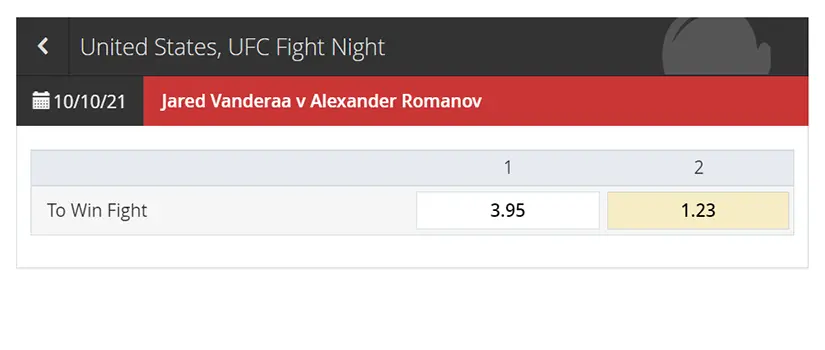
Over/Under Round Totals
Round totals are another commonly preferred bet type among MMA punters. Here you are punting on how long you think a bout will last in terms of rounds, and more specifically, whether the completed rounds will be over or under a specific number. Suppose, for example, you want to place a bet on a title UFC fight, which typically consists of five rounds, each one lasting for five minutes.
Your bookie has set the lines at 3.5 rounds. If you are betting on the under, you win provided the bout ends before it goes two minutes and thirty seconds into the third round. If you decide to punt on the over outcome, you win in case the fight continues beyond the two-minutes and thirty-seconds mark of the third round.
Most bookies would consider bouts that end exactly two minutes and thirty seconds into the third round a draw, in which case punters have their over/under bets returned. The bookmakers will again quote odds for the two sides of the wager, depending on the implied probabilities of the two parties involved in the bout.
Let’s assume Fighter Y has suffered knockout defeats in his last two outings, while Fighter X has performed better and has the potential to end the bout early by knocking his opponent out. The second scenario has a higher implied probability and the bookmaker would adjust the vigorish to reflect this like so:
- Over 3.5 – 200 (a winning $200 wager earns you $100)
- Under 3.5 -250 (a winning $250 wager earns you $100)
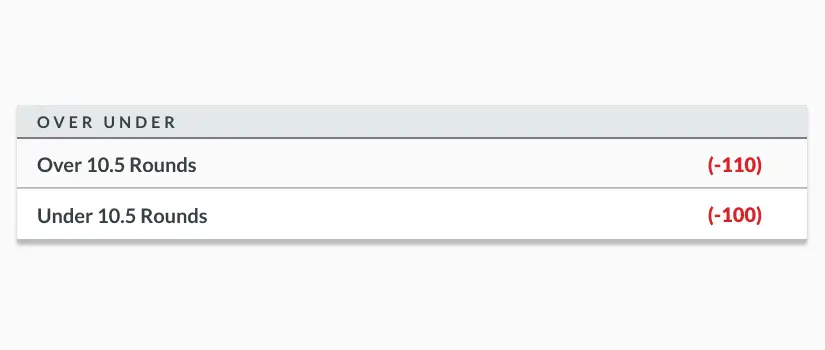
Go the Distance Bets
With this type of wager, punters are betting on whether or not the fighters will go through all rounds and still stand at the end of the contest. If you are confident a match will end before that due to disqualification, knockout, submission, or technical knockout, you can bet it will not go the distance. And vice versa, if you think both parties involved will survive until the end, you are betting the bout will go the distance. The winner of the bout is irrelevant in this case.
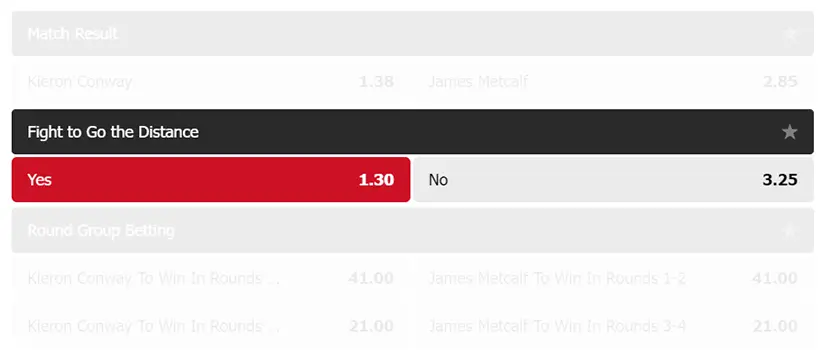
Method of Victory Bets
This type of wager is more suitable for seasoned punters who are familiar with the sport and regularly watch the fights. Method-of-victory bets are more specific and yield higher payouts. Your goal is to predict exactly how the winner will prevail over his opponent. You have to pick the winning fighter along with the exact method of winning.
This could be a knockout, technical knockout, disqualification, submission, or by the judges’ decision. The odds bookies quote vary for each method of victory since the implied probability for each possible outcome is different.
Here is an example to give you more context. Fighter X is notorious for their superior knockout potential. Respectively, a wager on knockout would yield a lower payout compared to one on submission, for instance.
Meanwhile, Fighter Y is more on the defensive side and has developed remarkable submission skills. The implied probability of Fighter Y winning through submission or decision would be higher, which would result in lower odds and a smaller payout.
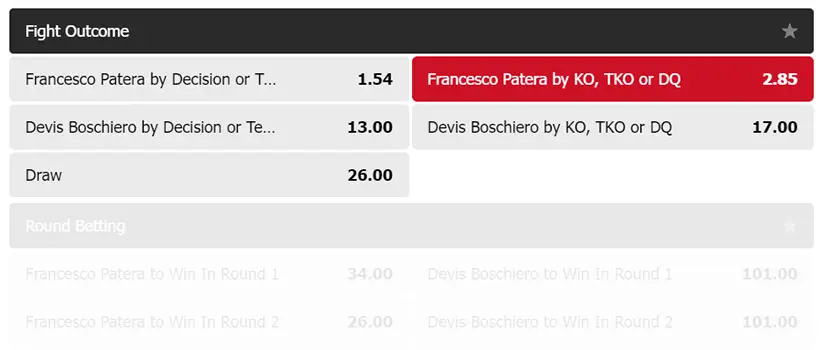
Proposition Bets on Fight Awards
If you are familiar with the UFC promotion, you have probably noticed that the organization awards various bonuses to fighters, for example, for bout of the night, performance of the night, and so on. The largest online sportsbooks usually take action on the fighters who can scoop those awards. Some even accept bets both on individual bouts and individual fighters, giving you two chances to pocket a payout. You simply have to predict correctly who will go home with a given award and for which fight.
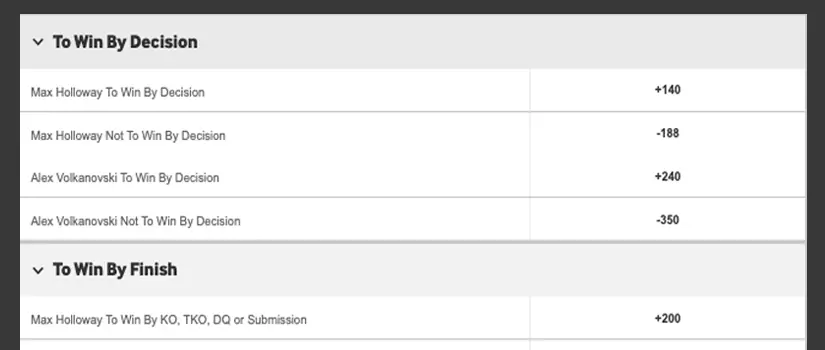
Outright Bets
Outrights are long-term wagers, meaning that they are often running for months until settled. Outright betting allows you to place bets on future MMA bouts that are yet unconfirmed. Similarly to boxing, negotiations for major bouts often require months to confirm. With outright betting, punters can post early wagers on unconfirmed bouts that are yet to be scheduled.
If a given event is not scheduled within a specific timeframe, the sportsbook will void the outright bets placed on it and refund them to players. Many seasoned bettors prefer outrights because they enable them to gain a lead on the odds and potentially pocket larger payouts. With that in mind, outright odds typically change once an event gets scheduled and the training of the fighters involved commences. In essence, outright wagering on unscheduled bouts may give punters the benefit of boosted odds.
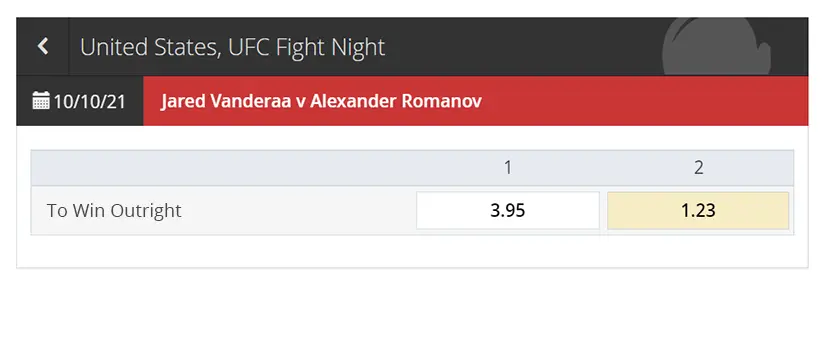
In-Play Betting on MMA Bouts
One great thing about taking your MMA action online is that most virtual sportsbooks allow you to place in-play wagers on live fights as they unfold. Live betting essentially works in the same way as regular sports betting. The biggest difference is that the odds fluctuate constantly as the events progress. While it allows punters to potentially predict when is the right moment to post a wager, in-play betting can also be quite tricky.
However, it is fair to say the risk is usually worth it. You can bag a handsome payout if you place the right wager at the right time. Here is an example. Fighter X has suffered a poor start in a given bout, which causes their odds to widen as their implied probability of winning drops.
If you back Fighter X with an in-play wager at this point but his performance improves later on and he knocks out his opponent, you will collect a larger payout. In other words, in-play betting enables you to not only win but win at higher odds. Of course, the risk is inherently greater but in-play betting is well worth it if you are an experienced punter.
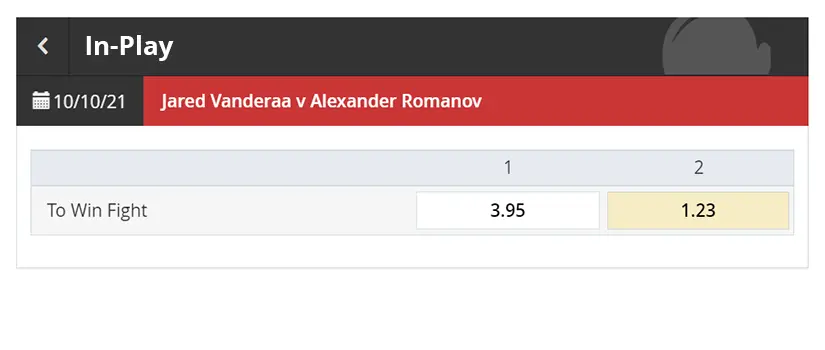
Why Betting on the MMA Can Be Lucrative
The popularity of MMA betting has grown tremendously in recent years and there are plenty of good reasons for that, starting with the fact it enables fans of the sport to pocket large amounts of money. More and more punters are beginning to recognize the winning opportunities that come with betting on this combat sport. Here are the main reasons why betting on MMA events can prove to be lucrative for punters.
- MMA does not require as extensive analysis as other sports. Unlike team sports like soccer and basketball, the MMA requires bettors to analyze the performance of two athletes only. Each bout involves only two fighters, which makes it easier for punters to map out a coherent betting strategy. By contrast, analyzing the performance of an entire team requires significantly more time and effort.
- Punters have plenty of information about MMA fighters at their disposal. Consistent research is crucial when it comes to winning in sports betting. MMA bettors can carry out in-depth research on MMA athletes before they face each other thanks to the numerous media outlets reporting on the fighters’ past performances. You can easily find details about injuries, fouls, training, and previous results. All this renders it easier to devise an adequate strategy for online MMA betting.
- Bookmakers tend to make more mistakes when setting MMA odds. Bookies are humans after all and as such are not immune to making mistakes. Errors in MMA odds setting are more common compared to other sports since the discipline is relatively new.
Oddsmakers are not as experienced with this sport as they are with baseball or basketball, for instance. Smart punters can capitalize on their mistakes. It is worth mentioning that bookmakers are getting better and better at quoting MMA odds as the combat sport matures. In turn, this renders them less prone to errors.
MMA Betting Strategy and Tips
Our guide on MMA betting would be incomplete if we fail to give you some strategy advice. Super Betting Sites’ experts have compiled several tips that can improve your chances of becoming a successful MMA bettor. Check out what our experts have to say in the paragraphs to follow.
 Basic Rules
Basic Rules